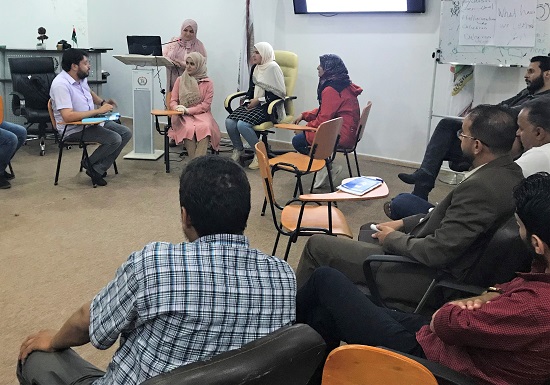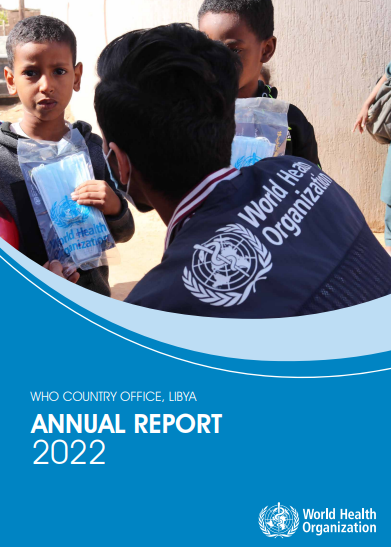 In eastern Libya, primary care doctors participate in role play during a mental health training.
In eastern Libya, primary care doctors participate in role play during a mental health training.
"When a doctor plays a patient during role play, they feel what the patient feels," says Dr Tarek Bader, a trainer at a workshop for primary health care doctors in Libya. "They see it from the other side."
In early July 2019, 30 doctors from eastern Libya gathered in the city of Al-Bayda. Few had specialized training in mental health disorders or in the communications skills needed to, for example, break bad news to patients. At a workshop run by WHO, they improved those skills while learning how to identify and treat the most common mental illnesses.
“It was an eye-opener for me,” says Dr Mohamed Abdelwanis, who is staff at a primary health clinic in Tobruk. He says the training helps him identify subtle signs and better differentiate between psychosomatic complaints and other issues: "now I can help my patients better.”
Mental health training is even more critical given the turmoil that Libyans have faced in recent years. Armed conflict in the country’s capital, as well as unrest in other areas, have up-ended people’s jobs, homes, and families.
During the workshop, primary health care doctors participate in role-playing, analyse case studies, and practise taking a mental health history. Most importantly, they learn to listen. The communication skills component includes sections on topics like “managing anger” and “talking to the whole family.”
“Sometimes patients don’t believe my diagnosis and I would argue with them. Now, I think I can build better relationships with my patients,” says Dr Ghada Abdelraheem, who works at a clinic in Al-Bayda. “I learned how to communicate better and more patiently.”
Dr Saeid Almashay concurs. “I tell patients they have diabetes. For some of them it’s devastating,” he says. “Some of them refuse my diagnosis.
“It’s challenging. We learn how to become more empathetic,” says Dr Almashay. “And to realize that denial is part of the process.”
“I had a patient with a brain tumour. I transferred him to a neurology specialist, who told him,” says Dr Abdelraheem. “If I had to face the same patient again, I would follow the steps from the communication skills training and break the news gradually and with empathy.”
Workshop participants learn practical diagnostic skills. "The most common question from trainees is how to identify the disease as psychological and when to transfer the patient to a specialist," says Dr Tarek Bader. “Some cases should not be transferred, like simple anxiety or simple depression. But if the anxiety is complicated, or if the person is suicidal or psychotic, they should be transferred.”
The primary care doctors also learn about which medicines to consider prescribing. "GPs are afraid to take the first step and prescribe drugs. They fear dependence,” says Saeid Almashay. "But the majority of these drugs don’t cause dependence. I think this training has changed their thoughts and they can prescribe antidepressants now."
Participants were able to put their new skills in service of patients at the Africa Foundation for Orphans, where they spoke to children who had lost one or both parents. Using techniques learned in the training, they worked to help children traumatized by events in their past.
Primary care doctors have more confidence that, equipped with better knowledge, they can help their patients. “The biggest problem for patients is access to the one psychiatric hospital here, because of the stigma,” says Tarek Bader. “So if we provide mental health care at the primary health care level, the patients avoid that stigma.”
WHO works with Libya’s health officials to make sure doctors receive the training they need, especially given the toll that conflict is taking on the country. "The Ministry of Health officials from this area in the east wants to replicate this programme,” says Dr Ahmad Salem, Public Health Officer for WHO Libya. "They say, 'We want to address post-traumatic stress disorder. When the fighters get back home, how can we engage them in the community again?'"
"It’s had a great impact on me because for us, we didn’t get a lot of training on psychological issues," says Dr Said Elmashay. "You can’t learn certain types of medicine from books, you need supervision by experts."
By focusing on both practical and “softer” skills, the workshops help doctors address people’s needs with more patience and understanding.
“In the role play, I saw it was really important to give patients time for emotion,” says Dr Mohammed Abdelwanis Trainee “So often we give the bad news, give them a drug, and go on to the next patient.
“Now I see that you need to make time for silence and crying, the human side of the process.”
In summer 2019, WHO’s mental health workshops for primary care doctors in Libya were funded by the UK’s Department for International Development. They were conducted in collaboration with Libya’s Ministry of Health and led by Libyans who were part of a WHO “training of trainers” workshop in late January 2019.





 Libya country office annual report, 2022
Libya country office annual report, 2022
